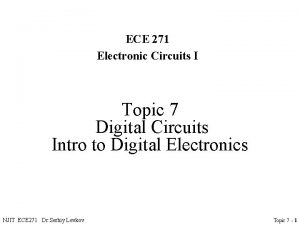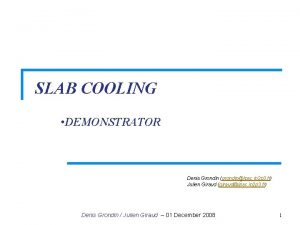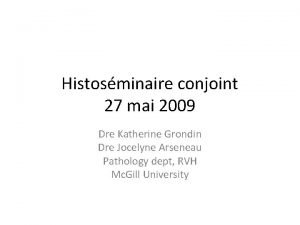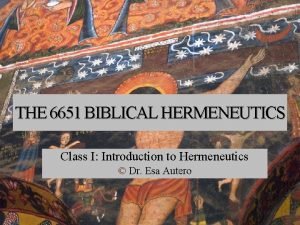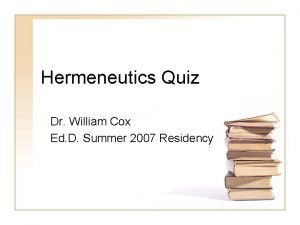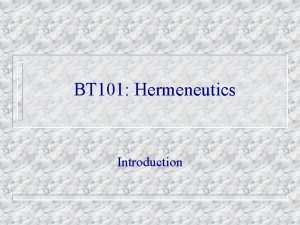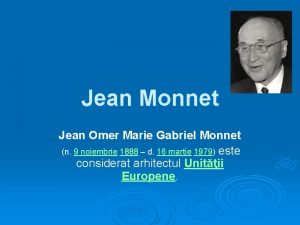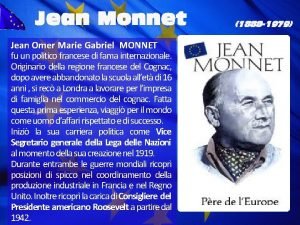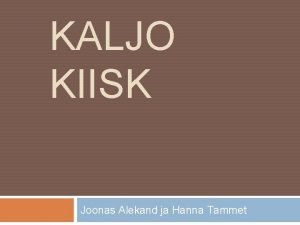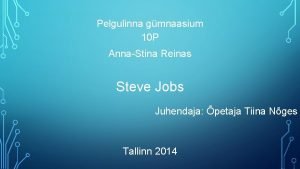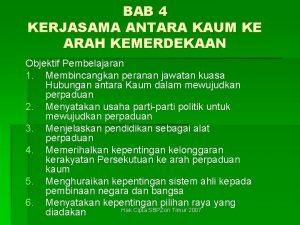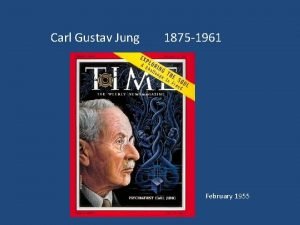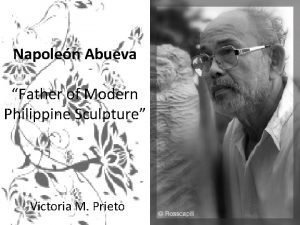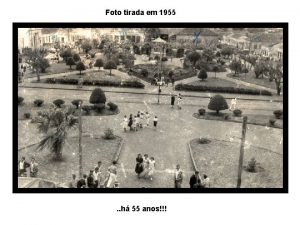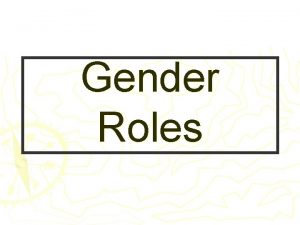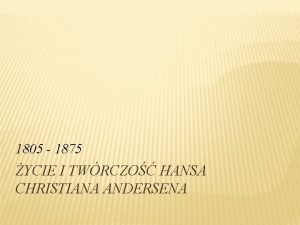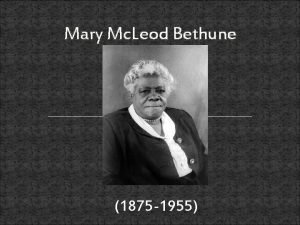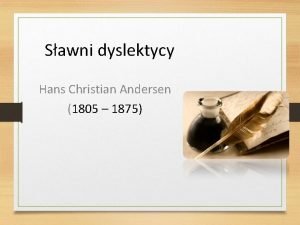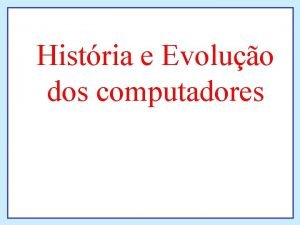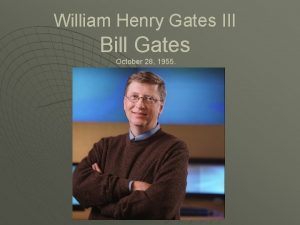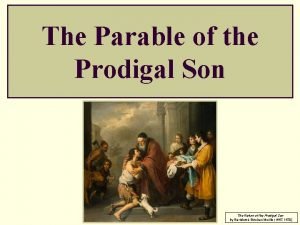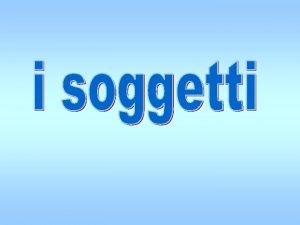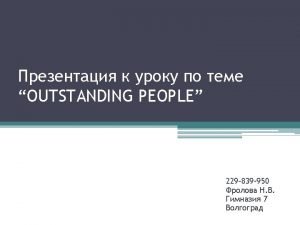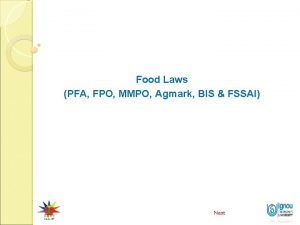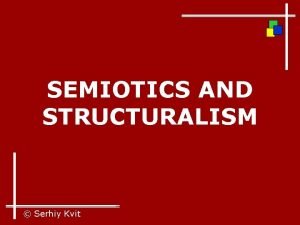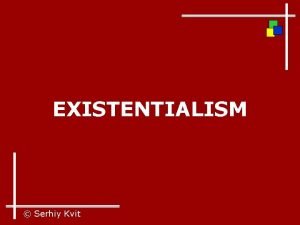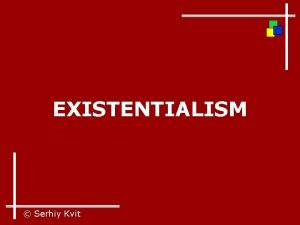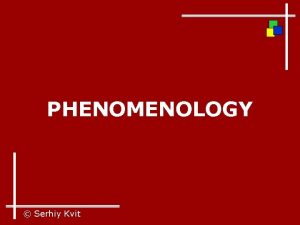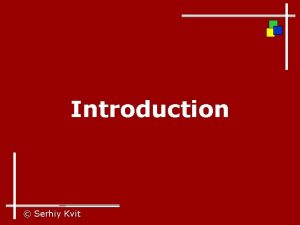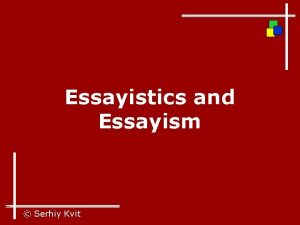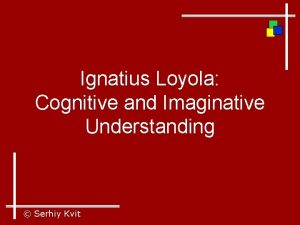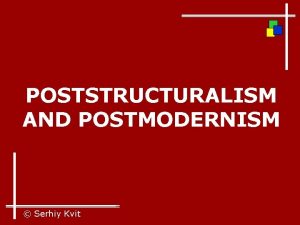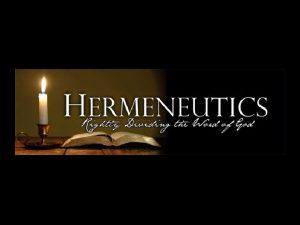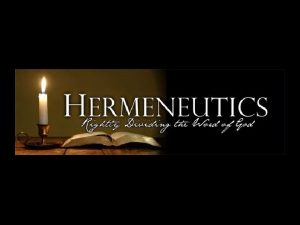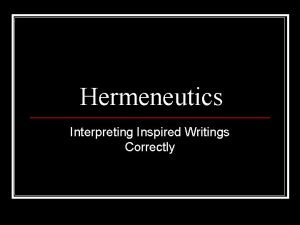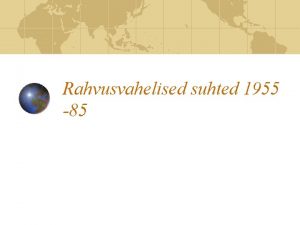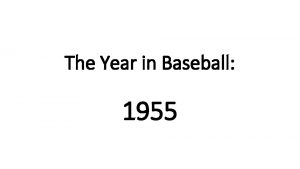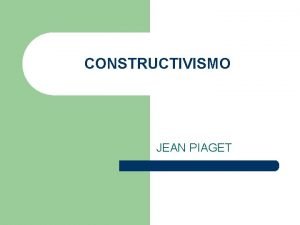PHILOSOPHICAL HERMENEUTICS Serhiy Kvit Jean Grondin 1955 universal







































- Slides: 39

PHILOSOPHICAL HERMENEUTICS © Serhiy Kvit

Jean Grondin (нар. 1955) universal significance of hermeneutics

Jean Grondin Ø Gadamer: "Grundin's merit is to develop this" inner "conversation as the true basis of hermeneutics, which (as I have noted in" Truth and Method ") plays an important role in Augustine. . . " Ø Universalism of philosophical hermeneutics

St. Augustine (354 -430) Christian doctrine On Trinity

St. Augustine Ø The doctrine of the inner (heart) word: Gadamer learned from Augustine that the meaning communicated through the language is not an abstract logical meaning, like a certain statement, but is actual interaction that is carried out in it. Ø Father of Existentialism. Ø Passionate interpreter. Ø Scripture is accessible even to children. Ø The rules of understanding the Holy Scripture have only an added value for the believer.

Martin Heidegger (1889– 1976) language is the home of being

Martin Heidegger Understanding Ø the main characteristic of human being Ø penetration into the essence of the thing itself Ø things are not something available (positivism), it's not the facts of consciousness (Husserl), they belong to the human way of being (a special way of constitute, the formation of the world)

Dasein (here-being) Ø is not a cognitive act Ø not deduced from the explanation Ø being-opportunity (which causes the caring build of the world) Ø plan (not an embodiment of a plan, but something that characterizes the possibility of being) Ø disclosure, daylight, penetration into the fundamental structure of being

Dasein has always been drawn into one opportunity and missed the others, and thus lost certain opportunities of their own being. Hence the importance of "abandonment" is revealed. Dasein is a truly abandoned opportunity, left to itself and, thus, free to choose different opportunities. " The question of "forgetting being" is related to the ontic of any project of life, which allows one to see only objectivity.

Hermeneutic Circle Understanding as the disclosure of "presence" is based on the whole, since it acts in the mode of pre-vision. Part assumes the whole, and the latter is understood as the bond of parts. But the circle can not be regarded as "vicious" because it does not reveal any arbitrary interpretation procedure, but expresses the existential structure of Dasein. Heidegger: "The most important thing is not to go beyond the circle, but how to get into it correctly. "

Hermeneutic Circle Gadamer: Pre-understanding and pre-judgment not only do not interfere with understanding, but make up its main element. The hermeneutic circle has not a methodological but an ontological character, dictated by the mutual precondition of pre-understanding of a text. In the process of understanding, there is a "fusion of horizons" of the interpreter and the text, and the dialogue (between the interpreter and the text) excludes subjectivity and relativism and changes the interpreter itself.

Being and Time The main thing is not the immortal soul (theology), not thinking (Descartes), but the existence (Kierkegaard: "Existence separates thinking from being"). The ecstatic existence of time is not an infinite sequence of moments "now, " but the integrity of three dimensions (ecstasies) - an existentially conscious past, present and future. "The existence in time does not mean the" sequence "of ecstasies. The future is not later the past, and the past is not earlier than the present. The existence in time is seen as the future that was the present. "

To be a Man The main sign of time is its finiteness. Open in relation to its finality, human existence is precisely open to life. "The essence of finitude - is the basic structure of human existence. " This explains such a essential role of the "existential" of fear. It, according to Heidegger, is a form of experience of a man of his own finiteness. "To be a man means to be mortal, that is: to dwell. "

Martin Heidegger’s Romanticism Ø language is the home of being Ø language thinks Ø philosophy = poetry Ø truth = piece of art Ø art is the formation and realization of the truth

Romantic Reduction person poet Dasein subject existence

Martin Heidegger Ø The path to the truth does not only lie through the language, it comes deep into the language as a source of the truth. Ø The inaccuracy of the expression distorts reality, and therefore the being itself as well. "Roman thought takes Greek words without the proper initial experience of what they say, without the Greek word itself. From that translation there is the beginning of the superficiality of Western thinking. " The purpose of the statement in the field of which there is the movement of thinking and poetry, is the correspondence with the language, that is, the essence.

Destruction strategy Destruction (the language of metaphysics) is the "issuance of a birth certificate", which is opposed to traditional historicism, the essence of which is the "false relativization" of ontological foundations.

Being and Time The thesis of Heidegger is that being is time. Heidegger understands being as availability, openness, self-knowledge. Dasein - this is the daylight in being, the distinction between being and those that is exist. He argues that the ground was forgotten in metaphysics, because it was always considered given in the forms of consciousness, subjectivity. The history of being and nothing can be interpreted as a history of oblivion of being.

Hans Georg Gadamer (1900– 2002) truth and method

Hans Georg Gadamer Ø Not only understanding, but also mutual understanding are achieved hrough hermeneutics. Ø Philosophy must demand of science and method, so that they recognize their partiality in the whole of human existence.

Hans Georg Gadamer Ø Language Ø History Ø Art Ø Philosophy

Hans Georg Gadamer As the Greeks have said, there is something between the interlocutors, to which they are involved and on what there is the exchange between them. Mutual understanding about something that needs to be achieved during the conversation will inevitably mean that a common language has being developed in the conversation. (. . . ) So, where the conversation came about, we will soon be filled with it, as we say. The play of speaking and speaking in response continues in the inner conversation of the soul with itself, as Plato so well called thinking.

Hans Georg Gadamer „Hermeneutics is a practice. Who can not use the practice of hermeneutics, its universal latitude and philosophical justification, it may find new and new methods by which it is possible to achieve success in the sciences, but the wise use of knowledge does not learn with their help. Everywhere we try to understand the world where the alienation is being overcome, where the assimilation is carried out, where ignorance and ignorance are removed, the hermeneutic process of gathering of the world in the word and into the general consciousness is carried out everywhere. And even the monological language of modern science acquires social reality only in this way.

Philosophical Hermeneutics This is not the art of understanding, but its theory. Although both the first and second forms of awareness grow out of practice, and without it remain like empty sound.

Artistic translation A text can be precisely translated only by the translator who will be able to give a linguistic expression to the subject, which will open to him the original text, that is, he will find a language that will be his own and at the same time correspond to the original. Thus, the translator's situation, in fact, coincides with the interpreter's situation.

Hermeneutic Circle Gadamer's hermeneutic effort is not aimed at moving into the author's situation, but in order to relate his message to own situation. In other words, the purpose of the interpretation is not to "restore", but to "build" the meaning of the message. Or, in other words, philosophical hermeneutics sees its main goal not in the reconstruction (of plan), but in the construction (of meaning).

Hans Georg Gadamer Interpretation ceases to be an external task in relation to the interpreter, turning into the existential action (Fathers of the Church).

Paul Ricoeur (1913 – 2005) conflict of interpretations

Paul Ricoeur Hermeneutics is a theory of understanding operations in their relation with the interpretation of texts; this is a consistent implementation of the interpretation. If the interpretation is a set of techniques applied directly to specific texts, then hermeneutics will be the discipline of the second level, which applies to the general rules of interpretation.

Paul Ricoeur He thinks in the context of different methodologies, trying to reconcile the philosophical doctrines that stand behind them.

Paul Ricoeur He points to the need to maintain the integrity of the world in the horizon of human existence through "the constitutional desire to be and the effort to be".

Paul Ricoeur The biggest difficulty that we meet today is to be able to remember everything and do not to remain a hostage of our own memory.

Paul Ricoeur Distinguishes the "I" (moi), who is the master over itself, and "I" (soi), who is a student of the text. The first concept relates us to Heidegger's judgments about the formation of the world. The second follows from the position of Gadamer in the exploration of the text, when we, by understanding and interpreting it, change ourselves under his influence.

Karl-Otto Apel (нар. 1922) discursive ethics

Discursive Ethics Anatoly Yermolenko: "One can conclude that responsibility as a dialogic and ontological principle is based primarily on the fact that people exist in the world with each other and for each other. They are responsible to each other and to the world, for themselves and for others, for the world in the past and future. This means that responsibility as the supreme obligation must be understood as co-existence-and-forothers-being-in-the-world. "

Discursive Ethics Karl-Otto Apel: "It's not about avoiding the bad, but about how to overcome the evil as injustice for all (. . . ) there is the possibility and need to understand justice as (an all-purpose) goal of the teleological perspective of evaluations, as a" regulatory idea" for all.

Jurgen Habermas (нар. 1929) consensual morality

Discursive ethics Jurgen Habermas: "In arguments, participants should proceed from the fact that, in principle, all as free levels participate in a joint search of the truth, which takes into account only the strength of a more powerful argument (. . . ), practical discourse can be defined as a process of understanding that in its form prompts at the same time all participants to the perfect changing of roles. [It's transforming] into a public event that is practiced together with all intersubjectively. "

Jurgen Habermas Ø Traditions of the Frankfurt School Ø Hermeneutic circle Ø A performative attitude Ø The discussion with Gadamer: between philosophy and method
 Nmos inverter with depletion load
Nmos inverter with depletion load Denis grondin
Denis grondin 27 mai 2009
27 mai 2009 Hermeneutics class
Hermeneutics class Hermeneuin
Hermeneuin Hermeneutic circle
Hermeneutic circle Hermeneutics quiz
Hermeneutics quiz Hermeneutics 101
Hermeneutics 101 Critical race theory tenets
Critical race theory tenets Jean-gabriel monnet
Jean-gabriel monnet Jean omer marie gabriel monnet
Jean omer marie gabriel monnet Zinaida kiisk
Zinaida kiisk Usa infotehnoloog 1955-2011
Usa infotehnoloog 1955-2011 Joseph luft and harry ingham in 1955
Joseph luft and harry ingham in 1955 Major landforms in vietnam
Major landforms in vietnam Faktor kemenangan parti perikatan 1955
Faktor kemenangan parti perikatan 1955 Nursing diagnosis of autism
Nursing diagnosis of autism Mbtitoday.org
Mbtitoday.org Ray kroc timeline
Ray kroc timeline Siyam na diwata ng sining (nine muses) (1994)
Siyam na diwata ng sining (nine muses) (1994) Foto 1955
Foto 1955 Albert einstein (1879-1955)
Albert einstein (1879-1955) Primeiro computador portatil
Primeiro computador portatil The good wife's guide 1955
The good wife's guide 1955 Monthly wife
Monthly wife Andersen - biografia dla dzieci
Andersen - biografia dla dzieci Asch 1955
Asch 1955 1955-1875
1955-1875 Fpo 1955
Fpo 1955 Sławni dyslektycy
Sławni dyslektycy Segunda geração transistor 1956 1965
Segunda geração transistor 1956 1965 William henry gates iii was born on 28 october 1955
William henry gates iii was born on 28 october 1955 Housekeeping monthly may 1955
Housekeeping monthly may 1955 The prodigal son movie 1955
The prodigal son movie 1955 Perceptual set example psychology
Perceptual set example psychology Legge 12 febbraio 1955 n. 51
Legge 12 febbraio 1955 n. 51 Throwaway living
Throwaway living William henry gates was born on 28 october 1955
William henry gates was born on 28 october 1955 Food product order
Food product order Medicinal preparation definition
Medicinal preparation definition
